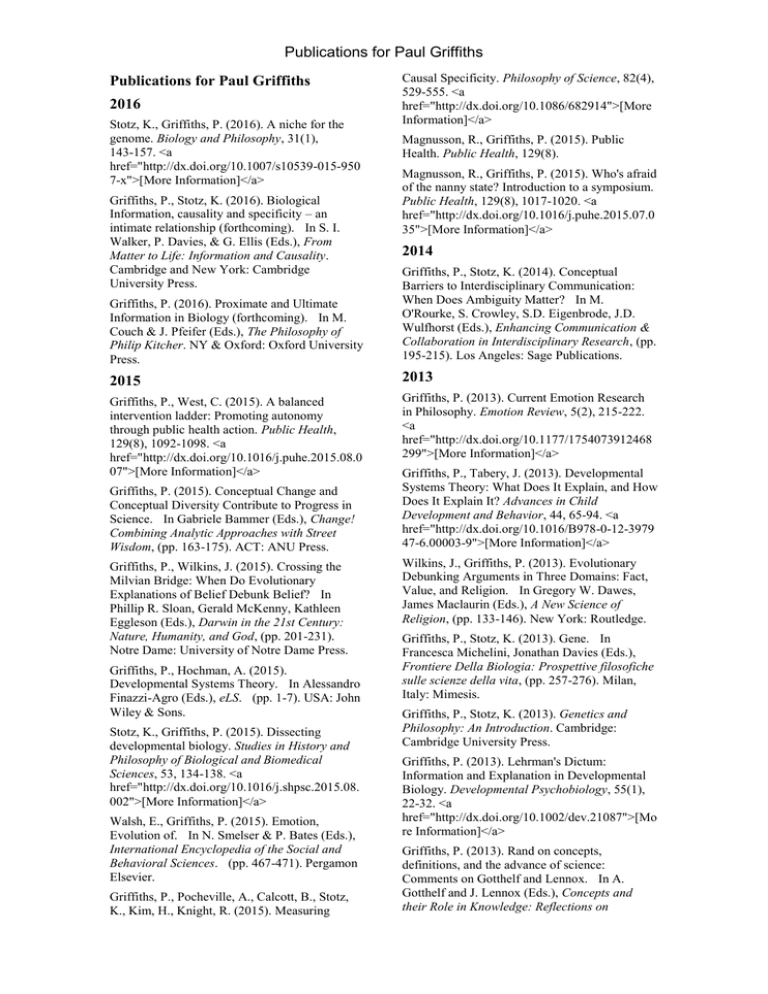Publications for Paul Griffiths 2016
advertisement

Publications for Paul Griffiths Publications for Paul Griffiths 2016 Stotz, K., Griffiths, P. (2016). A niche for the genome. Biology and Philosophy, 31(1), 143-157. <a href="http://dx.doi.org/10.1007/s10539-015-950 7-x">[More Information]</a> Griffiths, P., Stotz, K. (2016). Biological Information, causality and specificity – an intimate relationship (forthcoming). In S. I. Walker, P. Davies, & G. Ellis (Eds.), From Matter to Life: Information and Causality. Cambridge and New York: Cambridge University Press. Causal Specificity. Philosophy of Science, 82(4), 529-555. <a href="http://dx.doi.org/10.1086/682914">[More Information]</a> Magnusson, R., Griffiths, P. (2015). Public Health. Public Health, 129(8). Magnusson, R., Griffiths, P. (2015). Who's afraid of the nanny state? Introduction to a symposium. Public Health, 129(8), 1017-1020. <a href="http://dx.doi.org/10.1016/j.puhe.2015.07.0 35">[More Information]</a> 2014 Griffiths, P. (2016). Proximate and Ultimate Information in Biology (forthcoming). In M. Couch & J. Pfeifer (Eds.), The Philosophy of Philip Kitcher. NY & Oxford: Oxford University Press. Griffiths, P., Stotz, K. (2014). Conceptual Barriers to Interdisciplinary Communication: When Does Ambiguity Matter? In M. O'Rourke, S. Crowley, S.D. Eigenbrode, J.D. Wulfhorst (Eds.), Enhancing Communication & Collaboration in Interdisciplinary Research, (pp. 195-215). Los Angeles: Sage Publications. 2015 2013 Griffiths, P., West, C. (2015). A balanced intervention ladder: Promoting autonomy through public health action. Public Health, 129(8), 1092-1098. <a href="http://dx.doi.org/10.1016/j.puhe.2015.08.0 07">[More Information]</a> Griffiths, P. (2013). Current Emotion Research in Philosophy. Emotion Review, 5(2), 215-222. <a href="http://dx.doi.org/10.1177/1754073912468 299">[More Information]</a> Griffiths, P. (2015). Conceptual Change and Conceptual Diversity Contribute to Progress in Science. In Gabriele Bammer (Eds.), Change! Combining Analytic Approaches with Street Wisdom, (pp. 163-175). ACT: ANU Press. Griffiths, P., Wilkins, J. (2015). Crossing the Milvian Bridge: When Do Evolutionary Explanations of Belief Debunk Belief? In Phillip R. Sloan, Gerald McKenny, Kathleen Eggleson (Eds.), Darwin in the 21st Century: Nature, Humanity, and God, (pp. 201-231). Notre Dame: University of Notre Dame Press. Griffiths, P., Hochman, A. (2015). Developmental Systems Theory. In Alessandro Finazzi-Agro (Eds.), eLS. (pp. 1-7). USA: John Wiley & Sons. Stotz, K., Griffiths, P. (2015). Dissecting developmental biology. Studies in History and Philosophy of Biological and Biomedical Sciences, 53, 134-138. <a href="http://dx.doi.org/10.1016/j.shpsc.2015.08. 002">[More Information]</a> Walsh, E., Griffiths, P. (2015). Emotion, Evolution of. In N. Smelser & P. Bates (Eds.), International Encyclopedia of the Social and Behavioral Sciences. (pp. 467-471). Pergamon Elsevier. Griffiths, P., Pocheville, A., Calcott, B., Stotz, K., Kim, H., Knight, R. (2015). Measuring Griffiths, P., Tabery, J. (2013). Developmental Systems Theory: What Does It Explain, and How Does It Explain It? Advances in Child Development and Behavior, 44, 65-94. <a href="http://dx.doi.org/10.1016/B978-0-12-3979 47-6.00003-9">[More Information]</a> Wilkins, J., Griffiths, P. (2013). Evolutionary Debunking Arguments in Three Domains: Fact, Value, and Religion. In Gregory W. Dawes, James Maclaurin (Eds.), A New Science of Religion, (pp. 133-146). New York: Routledge. Griffiths, P., Stotz, K. (2013). Gene. In Francesca Michelini, Jonathan Davies (Eds.), Frontiere Della Biologia: Prospettive filosofiche sulle scienze della vita, (pp. 257-276). Milan, Italy: Mimesis. Griffiths, P., Stotz, K. (2013). Genetics and Philosophy: An Introduction. Cambridge: Cambridge University Press. Griffiths, P. (2013). Lehrman's Dictum: Information and Explanation in Developmental Biology. Developmental Psychobiology, 55(1), 22-32. <a href="http://dx.doi.org/10.1002/dev.21087">[Mo re Information]</a> Griffiths, P. (2013). Rand on concepts, definitions, and the advance of science: Comments on Gotthelf and Lennox. In A. Gotthelf and J. Lennox (Eds.), Concepts and their Role in Knowledge: Reflections on Publications for Paul Griffiths objectivist epistemology, (pp. 139-147). Pittsburgh, USA: University of Pittsburgh Press. 2012 Marais, B., Crawford, J., Iredell, J., Ward, M., Simpson, S., Gilbert, G., Griffiths, P., Kamradt-Scott, A., Colagiuri, R., Jones, C., et al (2012). One world, one health: Beyond the Millennium Development Goals. The Lancet, 380(9844), 805-806. <a href="http://www.ncbi.nlm.nih.gov/entrez/query. fcgi?cmd=Retrieve&db=pubmed&dopt=Abstract &list_uids=22939683">[More Information]</a> 2011 Scarantino, A., Griffiths, P. (2011). Don't Give Up on Basic Emotions. Emotion Review, 3(4), 444-454. <a href="http://dx.doi.org/10.1177/1754073911410 745">[More Information]</a> Linquist, S., Machery, E., Griffiths, P., Stotz, K. (2011). Exploring the folkbiological conception of human nature. Philosophical Transactions of the Royal Society B. Biological Sciences, 366, 444-453. <a href="http://dx.doi.org/10.1098/rstb.2010.0224" >[More Information]</a> Griffiths, P. (2011). Our Plastic Nature. In Snait B. Gissis and Eva Jablonka (Eds.), Transformations of Lamarckism: From Subtle Fluids to Molecular Biology, (pp. 319-330). Cambridge, Mass; USA: MIT Press. 2010 Griffiths, P. (2010). Emotion on Dover Beach: Feeling and Value in the Philosophy of Robert Solomon. Emotion Review, 2(1), 22-28. <a href="http://dx.doi.org/10.1177/1754073909345 548">[More Information]</a> Tabery, J., Griffiths, P. (2010). Historical and Philosophical Perspectives on Behavioral Genetics and Developmental Science. In Kathryn E Hood, Carolyn Tucker Halpern, Gary Greenberg, and Richard M. Lerner (Eds.), Handbook of Developmental Science, Behavior, and Genetics, (pp. 41-60). Oxford, UK: Wiley-Blackwell Publishing. Trent, R., Otlowski, M., Ralston, M., Lonsdale, L., Young, M., Suthers, G., Griffiths, P., Delatycki, M., Christodoulou, J., Barlow-Stewart, K. (2010). Medical Genetic Testing: Information for health professionals, NHMRC Publication reference: E99, (pp. vi 94). Canberra, Australia: Australian Government National Health and Medical Research Council. 2009 Griffiths, P., Scarantino, A. (2009). Emotions in the Wild: The Situated Perspective on Emotion. In Phillip Robbins, Murat Aydede (Eds.), The Cambridge Handbook of Situated Cognition, (pp. 437-453). New York, United States: Cambridge University Press. Griffiths, P. (2009). In What Sense Does 'Nothing Make Sense Except in the Light of Evolution'? Acta Biotheoretica, 57, 11-32. <a href="http://dx.doi.org/10.1007/s10441-008-905 4-9">[More Information]</a> Colyvan, M., Linquist, S., Grey, W., Griffiths, P., Odenbaugh, J., Possingham, H. (2009). Philosophical Issues in Ecology: Recent Trends and Future Directions. Ecology and Society, 14(2), 22-1-22-12. Brown, J., Birmingham, A., Griffiths, P., Jossinet, F., Kachouri-Lafond, R., Knight, R., Lang, F., Leontis, N., Steger, G., Stombaugh, J., et al (2009). The RNA structure alignment ontology. RNA, 15(9), 1623-1631. <a href="http://dx.doi.org/10.1261/rna.1601409">[ More Information]</a> Griffiths, P., Linquist, S. (2009). The Vernacular Concept of Innateness. Mind and Language, 24(5), 605-630. <a href="http://dx.doi.org/10.1111/j.1468-0017.200 9.01376.x">[More Information]</a> 2008 Griffiths, P., Tabery, J. (2008). Behavioral genetics and development: Historical and conceptual causes of controversy. New Ideas in Psychology, 26, 332-352. <a href="http://dx.doi.org/10.1016/j.newideapsych.2 007.07.016">[More Information]</a> Stotz, K., Griffiths, P. (2008). Biohumanities: Rethinking the relationship between biosciences, philosophy and history of science, and society. The Quarterly Review of Biology, 83(1), 37-45. <a href="http://dx.doi.org/10.1086/529561">[More Information]</a> Griffiths, P. (2008). Ethology, Sociobiology, and Evolutionary Psychology. In Sahotra Sarkar, Anya Plutynski (Eds.), A Companion to Philosophy of Biology, (pp. 393-414). Oxford: Blackwell Publishers. Griffiths, P., Stotz, K. (2008). Experimental Philosophy of Science. Philosophy Compass, 3(3), 507-521. <a href="http://dx.doi.org/10.1111/j.1747-9991.200 8.00133.x">[More Information]</a> Griffiths, P. (2008). Generating Thoughts on Genetics, Review of Fagot-Largeault A., et al (Eds) :The Influence of Genetics on Contemporary Thinking. Metascience, 17(2), 273-275. Griffiths, P., Machery, E. (2008). Innateness, Publications for Paul Griffiths Canalization, and 'Biologicizing the Mind'. Philosophical Psychology, 21(3), 397-414. <a href="http://dx.doi.org/10.1080/0951508080220 1146">[More Information]</a> Griffiths, P. (2008). Philosophy of Biology. In Edward N. Zalta (Eds.), Stanford Enclopedia of Philosophy. USA: Metaphysics Research Lab, CSLI, Stanford University. Griffiths, P. (2008). Review of Gut Reactions: A Perceptual Theory of Emotion by Jesse Prinz. The British Journal for the Philosophy of Science, 59, 559-567. 2007 Thomson, C., Capolingua, R., Caris, S., Coyne, C., Dunbar, T., Sainsbury, P., Gleeson, G., Griffiths, P., Maley, B., O'Connor, M., Pike, G., et al (2007). Griffiths, P. (2007). Evo-devo meets the mind: towards a developmental evolutionary psychology. In Roger Sansom and Robert N. Brandon (Eds.), Integrating evolution and development : from theory to practice, (pp. 195-225). Mass; London: MIT Press. Griffiths, P., Stotz, K. (2007). Gene. In Hull, David and Ruse, Michael (Eds.), The Cambridge Companion to the Philosophy of Biology, (pp. 85-102). New York, USA: Cambridge University Press. Griffiths, P. (2007). Philosophy of Biology in Britain, Review of O'Hear, A (Ed) "Philosophy, Biology and Life". Metascience, 16(3), 535-537. Griffiths, P. (2007). Precision, stability and scientific progress. Social Science Information, 46(3), 391-395. <a href="http://dx.doi.org/10.1177/0539018407046 0030104">[More Information]</a> Brigandt, I., Griffiths, P. (2007). The importance of homology for biology and philosophy. Biology and Philosophy, 22(5), 633-641. <a href="http://dx.doi.org/10.1007/s10539-007-909 4-6">[More Information]</a> Griffiths, P. (2007). The phenomena of homology. Biology and Philosophy, 22(5), 643-658. <a href="http://dx.doi.org/10.1007/s10539-007-909 0-x">[More Information]</a> 2006 Griffiths, P. (2006). Evolutionary Psychology. In Sarkar S. & Pfeiffer J. (Eds.), The Philosophy of Science: An Encyclopedia. (pp. 263-268). New York: Routledge imprint of Taylor & Francis. Griffiths, P. (2006). Function, Homology, and Character Individuation. Philosophy of Science, 73(1), 1-25. Griffiths, P., Stotz, K. (2006). Genes in the Postgenomic Era. Theoretical Medicine and Bioethics, 27(6), 499-521. <a href="http://dx.doi.org/10.1007/s11017-006-902 0-y">[More Information]</a> Griffiths, P. (2006). Philosophy of Biology. In Sarkar S. & Pfeiffer J. (Eds.), The Philosophy of Science: An Encyclopedia. (pp. 68-75). New York: Routledge imprint of Taylor & Francis. Griffiths, P. (2006). Review of Basic Instinct: The Genesis of Behavior by Mark S. Blumberg. The Quarterly Review of Biology, 81(1). Griffiths, P. (2006). Survey Review: Recent Work on the Evolution of Culture. Metascience, 15(2). Griffiths, P. (2006). The Baldwin Effect and Genetic Assimilation: Contrasting Explanatory Foci and Gene Concepts in Two Approaches to an Evolutionary Process. In Peter Carruthers,Stephen Laurence,Stephen Stich (Eds.), The Innate Mind: Volume 2: Culture and Cognition, (pp. 91-101). USA: Oxford University Press. Griffiths, P. (2006). The Fearless Vampire Conservator: Philip Kitcher, Genetic Determinism, and the Informational Gene. In E.M. Neumann-Held & C. Rehmann-Sutter (Eds.), Genes in Development: Re-reading the molecular paradigm, (pp. 175-198). Durham and London: Duke University Press. Stotz, K., Bostanci, A., Griffiths, P. (2006). Tracking the Shift to 'Postgenomics'. Community Genetics, 9(3), 190-196. 2005 Griffiths, P., Gray, R. (2005). Discussion: Three ways to misunderstand developmental systems theory. Biology and Philosophy, 20(2-3), 417-425. <a href="http://dx.doi.org/10.1007/s10539-004-075 8-1">[More Information]</a> Griffiths, P. (2005). Review of Embryology, Epigenesis and Evolution: Taking Development Seriously by Jason Scott Robert. Philosophy in Review, 25(3), 222-224. Griffiths, P. (2005). Review of Niche Construction: The neglected process in evolution by F. John Odling-Smee, Kevin N.Laland, Marcus W. Feldman. Biology and Philosophy, 20(1), 11-20. <a href="http://dx.doi.org/10.1007/s10539-004-160 5-0">[More Information]</a> 2004 Griffiths, P. (2004). Emotions as Natural and Normative Kinds. Philosophy of Science, 72(5), 901-911. Publications for Paul Griffiths Stotz, K., Griffiths, P. (2004). Genes: philosophical analyses put to the test. History and Philosophy of the Life Sciences, 26(1), 5-28. Stotz, K., Griffiths, P., Knight, R. (2004). How biologists conceptualize genes: an empirical study. Studies in History and Philosophy of Biological and Biomedical Sciences, 35, 647-673. Griffiths, P. (2004). Instinct in the '50s: the British reception of Konrad Lorenz's theory of instinctive behaviour. Biology and Philosophy, 19(4), 609-631. <a href="http://dx.doi.org/10.1007/sBIPH-004-0537 -z">[More Information]</a> Griffiths, P. (2004). Is Emotion a Natural Kind? In Robert Solomon (Eds.), Thinking and Feeling: Contemporary Philosophers on Emotion, (pp. 233-249). Oxford: Oxford University Press. Griffiths, P. (2004). Liberals Ate My Genes? (SECTION 3). Metascience, 13(1), 39-44 (notes: 50-51). Griffiths, P., Gray, R. (2004). The Developmental Systems Perspective: Organism-environment systems as units of evolution. In Massimo Pigliucci and Katherine Preston (Eds.), Phenotypic Integration: Studying the Ecology and Evolution of Complex Phenotypes, (pp. 409-431). New York: Oxford University Press. Griffiths, P. (2004). Towards a Machiavellian theory of Emotional Appraisal. In Dylan Evans and Pierre Cruse (Eds.), Emotion, Evolution and Rationality, (pp. 89-105). Oxford: Oxford University Press. (pp. 1130-1136). London: Macmillan Press. Griffiths, P. (2003). Emotions. In Stephen P. Stich and Ted A. Warfield (Eds.), The Blackwell Guide to the Philosophy of Mind, (pp. 288-308). Malden, Ma; Oxford; Carlton South, Vic; Berlin: Blackwell Publishers. Griffiths, P. (2003). Smile, and the whole world smiles with you: Review of Emotions Revealed by Paul Ekman. New Scientist (Australasian Edition), 178(2400), 56. 2002 Griffiths, P. (2002). Developmental Systems Theory. Nature Encyclopedia of the Life Sciences. (pp. http://www.els.net/). London: Nature Publishing Group. Griffiths, P. (2002). Life Science. Making sense of Life: Explaining Biological Development with Models, Metaphors and Machines - Review of Keller, E. F. (2002). JAMA: The Journal of the American Medical Association, 288(24), 3170. 2001 Griffiths, P., Oyama,, S., Gray, R. (2001). Cycles of Contingency: Developmental Systems and Evolution. United States: MIT Press. Griffiths, P., Gray, R. (2001). Darwinism and Developmental Systems. In Not known (Eds.), Cycles of Contingency: Developmental Systems and Evolution, (pp. 195-218). United States: MIT Press. 2003 Griffiths, P. (2001). Emotion and the problem of psychological categories. In Alfred W. Kaszniak (Eds.), Emotions, Qualia and Consciousness, (pp. 28-41). United States: World Scientific Publishing. Griffiths, P. (2003). Basic Emotions, Complex Emotions, Machiavellian Emotions. In Anthony Hatzimoysis (Eds.), Philosophy and the Emotions, (pp. 39-67). Cambridge: Cambridge University Press. Griffiths, P. (2001). Evolutionary Perspectives on Emotion. In Alfred W. Kaszniak (Eds.), Emotions, Qualia and Consciousness, (pp. 106-123). United States: World Scientific Publishing. Griffiths, P. (2003). Beyond the Baldwin Effect: James Mark Baldwin's 'Social Heredity', Epigenetic Inheritance and Niche-Construction. In Bruce H Weber and David J Depew (Eds.), Evolution and Learning: The Baldwin Effect Reconsidered, (pp. 193-216). United States: MIT Press. Griffiths, P. (2001). From adaptive heuristic to phylogenetic perspective: Some lessons from the evolutionary psychology of emotion. In Harmon R. Holcomb, III (Eds.), Conceptual Challenges in Evolutionary Psychology: Innovative Research Strategies, (pp. 309-325). United Kingdom: Springer. Stotz, K., Griffiths, P. (2003). Dancing in the Dark: Evolutionary Psychology and the Argument from Design. In Steven J. Scher and Frederick Rauscher (Eds.), Evolutionary Psychology: Alternative Approaches, (pp. 135-160). United States of America: Kluwer Academic Publishers. Griffiths, P. (2001). Genetic Information: A Metaphor in Search of a Theory. Philosophy of Science, 68, 394-412. Griffiths, P. (2003). Emotion, Philosophical Issues about. Encyclopedia of Cognitive Science.




